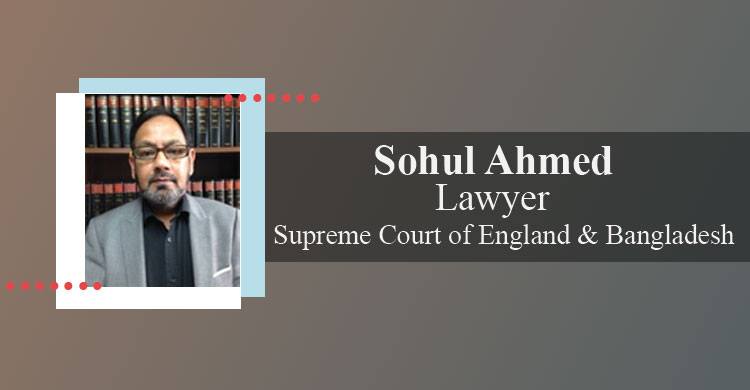Melt backlog of cases in the Courts in Bangladesh

Sohul Ahmed: The Judiciary is the backbone of the Rule of Law; hence, the Judiciary and Executive organ of the any country must ensure that the public are protected by effective administration of justice. The UNDP forecast that case logjam may bar to become a middle-mid-income country (The Protom Alo on 25 January 2021 published). Hence, The ministry in consultation with relevant stakeholders namely Apex court, Attorney General office Bangladesh Bar Council, must come up with a comprehensive plan of how and when this backlog will be addressed, while also ensuring fair and proper disposal of justice.
According to the source of the Dhaka Tribune news paper of Bangladesh dated July 16, 2020, there is a huge backlog of around 3.7 million cases pending with the courts in Bangladesh and increasing day by day. The Supreme Court administration’s statistics show that Bangladesh has a total of 3,684,728 case backlogs in Appellate division, High Court division and sub-ordinate courts across the country.
The litigants of Bangladesh have been suffering due to the backlog of cases and insufficient Judges and Courts.
The present and all former Chief Justices of Bangladesh concerned that courts are now over-burdened with a backlog of cases.
The present government has appointed judges to the Appellate Division, High Court Division and judges to the lower courts for disposing the cases quickly and introduce alternative dispute resolution system, but in fact, the backlog is still present in the country.
The rate of disposal of cases at the High Court has not increased, although a small number of judges were appointed to this court in recent years.
It has been observed by legal experts that the following approach is needed to reduce back log:
- The Government can introduce new laws with consultation with stakeholder namely Chief of Judiciary, President of the Bar Council and Attorney General or other relevant stakeholder that if anyone lodged false, meritless and harassment civil or criminal cases then the Court can impose fine to the relevant Lawyer, Client or public authority.
- Take initiative by the Chief Judiciary to Weed out unmeritorious cases from all courts in the country.
- The pile of pending cases at the both divisions of the Supreme Court could be reduced by constituting more separate benches,
- Adjudicate and complete civil cases which are more than five years old in all the Division of the High Court.
- Increase the power of subordinate judges (Resident Judge) to scrutinise merit of all new cases before listed for trial.
- Remove criminal cases, which are more than ten years in the High Court and Magistrates Courts.
Moreover, the his Excellency President of Bangladesh take initiative to appoint Judges in the High Court Division and the Government should take initiative to recruit subordinates courts. As an example every upazilla consists of at least 5 union councils and every one litigant from each union lodges at least 5 cases before the Assistant Judge Court situated in the District Courts and only one Assistant Judge has tried to disposing these cases. As a result, most of the litigants who file appeals to the Sub- Judge or District Judge Court are unsuccessful, whether there is merit or not. Similarly, there are 64 District and Session Judges who dispose a number of cases, two to three and at least one case goes to the to the High Court Division for further appeal. This means that every day 34 appeals go to the High Court and there are less than 100 Justices for the disposal of these cases.
According to the above scenario, the existing quantity of judges and courts are insufficient to disposes such cases.
It is the responsibility of Judiciary and Executive organ of Bangladesh to ensure justice for litigant people by implement the above proposal otherwise the backlog of pending cases at the country’s courts is growing higher day by day, while the rate of disposal of cases is increasing as the number of filing cases is increasing and our existing judges will be blamed.
Adjudication and weeding out of cases will lead to a reduction of case backlog. Sustainable reduction of case backlog however, requires the Judiciary to focus more on dealing with the causes of case backlog through increased case disposal, legal reform and adoption of performance management to ensure value for every shilling and effort invested in case backlog.
Sohul Ahmed: Advocate, Bangladesh Supreme Court & Solicitor, Supreme Court of England

